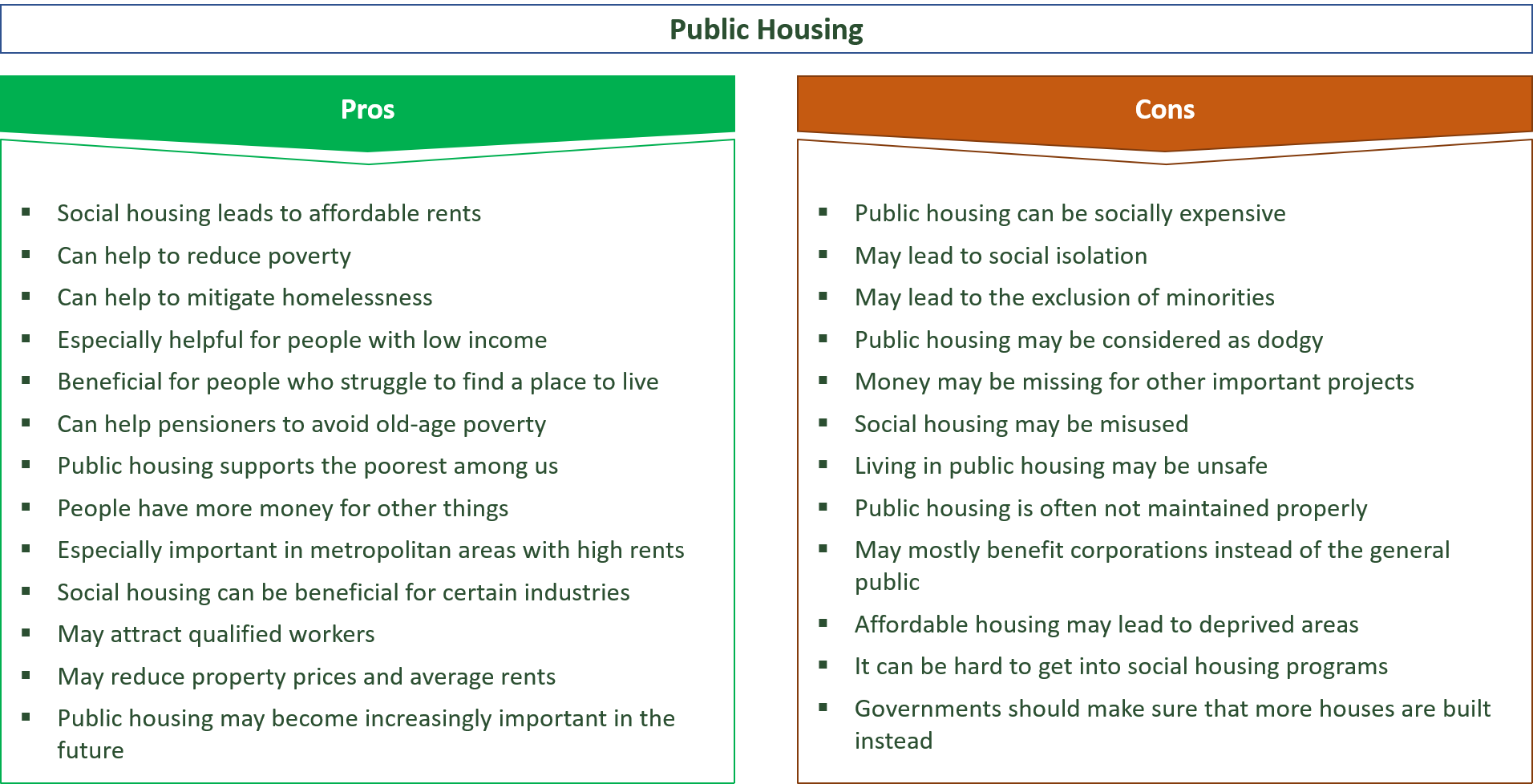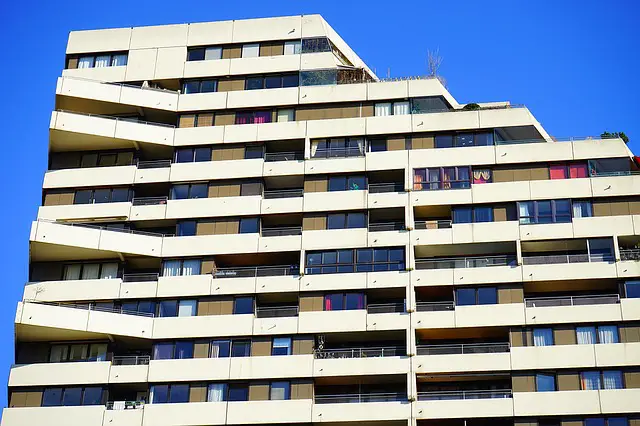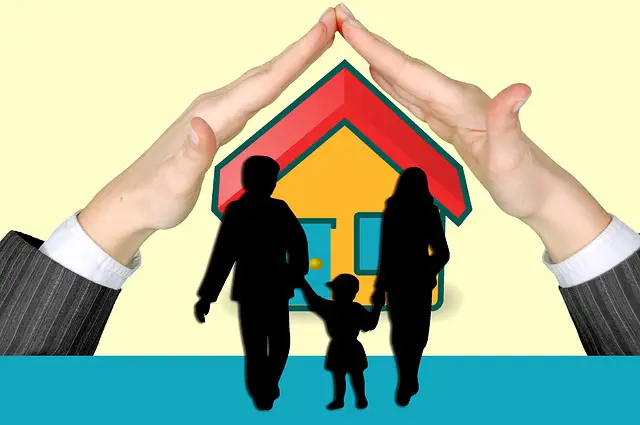“I started school in public housing. My dad had a sixth-grade education.”
Rick Scott, Politician
Advantages & Disadvantages of Public Housing

The concept of public housing (sometimes also referred to as social housing or affordable housing) has become increasingly popular over the past decades.
Homes that belong to public housing are owned by the government instead of private investors.
In turn, rents for those homes are usually far lower compared to rents for similar homes that are owned by private people.
Hence, social housing can be a great opportunity to provide people with low income with affordable living space.
However, apart from the many advantages of public housing, this concept also implies some downsides.
In this article, the pros and cons of public housing are examined.
Audio Lesson
Contents
Advantages of Social Housing
- Social housing leads to affordable rents
- Can help to reduce poverty
- Can help to mitigate homelessness
- Especially helpful for people with low income
- Beneficial for people who struggle to find a place to live
- Can help pensioners to avoid old-age poverty
- Public housing supports the poorest among us
- People have more money for other things
- Especially important in metropolitan areas with high rents
- Social housing can be beneficial for certain industries
- May attract qualified workers
- May reduce property prices and average rents
- Public housing may become increasingly important in the future
Social housing leads to affordable rents
One major advantage of public housing is that it can help to keep rents low for many people who are lucky enough to get into those social housing programs.
In fact, rents have increased quite a lot in many regions around the world and many people have to spend a big fraction of their overall income on rent.
Some people even struggle to pay their rent at all, even though they work in full-time jobs.
Thus, in order to increase the overall level of security in the housing market and to assure affordable rents for people who urgently need them, social housing can be a great way to go.
Can help to reduce poverty
Public housing can also help to reduce the overall level of poverty in the respective region.
In fact, high rents and poverty are closely related since the money for high rent payments will be missing in various other parts of peoples’ lives.
For instance, if families have to spend significant fractions of their overall income on rent, they will often no longer be able to provide good education opportunities for their kids.
If too much of the disposable income has to be spent on rent, there will simply be no way to send your kids to college if you don’t earn good money from your job.
In turn, your children may be trapped in poverty as well since education is key to overcome poverty and if you are not able to provide good education for your kids, chances are that they will suffer from the same problems as you later on in their lives.
Consequently, public housing can also indirectly help to improve education opportunities since families would be able to use a bigger fraction of their total income for the education of kids.
Can help to mitigate homelessness
Another benefit of social housing is that it can also help to reduce homelessness.
In fact, in some regions of our planet, homelessness has become a serious problem.
One major cause of homelessness is that people simply cannot pay their rents anymore since rents have increased far too much over the past years.
A prominent example of this is the Silicon Valley boom.
While rents have been rather affordable in this region before the tech boom, rents skyrocketed over the past decade.
In turn, even people who work in decent jobs are often no longer able to afford their rents since a few big tech companies pay quite high wages and employees of those companies drive the demand for housing in those regions.
With constant supply, increasing demand for housing leads to higher rents and to increasing risk of homelessness for people with low to medium income levels.
Especially helpful for people with low income
Another advantage of public housing schemes is that they are meant to provide affordable housing to people with only low income levels.
This means that social housing is a rather targeted scheme that helps out poor people while it doesn’t benefit the rich.
This can be quite important, also in the context of closing the wealth gap inside a country.
In fact, wealth inequality is a serious issue in many countries all over the world and in order to close the wealth gap, public housing in conjunction with other additional measures can greatly help in this regard.
Beneficial for people who struggle to find a place to live
Public housing can not only benefit poor people who are no longer able to pay rents on the private housing market, it can also greatly help people who do not find a place to live due to various other reasons.
For instance, landlords often prefer tenants who have a stable income and a secure job over people who don’t have those things.
Hence, people who are currently homeless or don’t have a job will often have a quite hard time finding a job since landlords will often not rent out to those people.
Therefore, for those people, it is crucial that the government provides them with opportunities so that those people will find a place to stay, especially if their qualifications are not good enough to compete in the private housing market.
Can help pensioners to avoid old-age poverty
Old-age poverty has become a serious issue in many countries all over the world.
This is often due to the fact that rents have increased much more than the average pension payments.
In turn, many old people will no longer be able to afford their rents and in the long run, they may even end up homeless in the streets. However, this should not be acceptable in our society.
In fact, if people worked their whole lives, they should have the security not to end up homeless due to excessive rent prices.
Therefore, in order to protect our older generation from old-age poverty and also from losing their homes, governments have to provide adequate public housing on a large scale.
Public housing supports the poorest among us
In general, social housing is meant to support the poorest among us.
In fact, life is hard sometimes and everyone of us can get into trouble sooner or later due to strokes of fate or also simply due to bad luck.
Especially in countries with insufficient welfare and social security, people will often no longer be able to pay their rent once they become unemployed and may end up in the streets.
Thus, if we are unlucky, everyone of us may end up in this situation and everyone of us would be grateful for public housing opportunities in such a case.
Consequently, social housing can also be considered as sort of welfare scheme that aims to protect the poorest in our society.
People have more money for other things
Another upside of public housing is that if people have to spend lower amounts of money on rent, they will have more money left for other parts of their daily life.
In fact, many people in our current state of the world have to spend a high fraction of their total salary on rent and those people will often not be able to spend any money on their hobbies.
However, this can lead to plenty of frustration over time since people feel that they only work for their landlord instead of fulfilling their own dreams.
Thus, social housing can also help to improve the overall quality of life of many people all over the world since it gives people more opportunities to afford things that make their lives easier.
Especially important in metropolitan areas with high rents
Especially in metropolitan areas, rents skyrocketed over the past decade.
In fact, the demand for housing in those areas has increased substantially over the past years and this trend seems to continue in the future.
This is due to the fact that an increasing number of people want to live alone instead of living together with a partner.
This trend leads to a state where each person needs more living space on average, which in turn also implies a serious housing shortage.
Therefore, also housing and rent prices increased quite a lot over the past years.
In turn, many people in those areas are no longer able to pay their rents and may end up homeless.
Thus, especially in those urban areas where the demand for housing is enormous, social housing programs can help quite a lot in order to lower rent and housing prices.
Social housing can be beneficial for certain industries
Public housing can not only be beneficial for private persons, it can also be quite helpful for many companies.
Especially in urban areas with a high demand for housing, workers who earn rather low salaries will often not be able to afford rent in those regions.
This also often implies a serious labor shortage in those regions, which in turn hurts many small companies who rely on those workers.
Hence, especially for companies that pay rather low wages to their workers, social housing schemes can be quite helpful to find enough workers to keep the business running.
May attract qualified workers
In general, social housing can also help to attract qualified workers in the respective region.
In fact, rent prices are a main factor when it comes to the decision of people regarding where to live.
Thus, if governments want to strengthen certain regions and want to attract qualified workers, chances are that social housing can also help in this regard.
May reduce property prices and average rents
Public housing may not only lower rents for publicly-owned property, it may also lower rents on the housing market in general.
If governments supply many affordable housing opportunities, the pressure on private landlords may increase to lower their rents as well since they may fear losing their tenants otherwise.
Thus, public housing can help to lower rent prices in general if enough additional social housing is offered in the respective region.
Public housing may become increasingly important in the future
An increasing number of people have moved from rural areas to cities over the past years and this trend will likely continue in the future.
This is due to the fact that job opportunities in big cities are usually much better and also the overall quality of life is often higher compared to many rural areas.
Hence, if the trend of moving to metropolitan areas continues in the future, also the housing problem will become worse and more social housing opportunities have to be offered to low-income earners so that they will not end up homeless sooner or later.

Disadvantages of Public Housing
- Public housing can be socially expensive
- May lead to social isolation
- May lead to the exclusion of minorities
- Public housing may be considered as dodgy
- Money may be missing for other important projects
- Social housing may be misused
- Living in public housing may be unsafe
- Public housing is often not maintained properly
- May mostly benefit corporations instead of the general public
- Affordable housing may lead to deprived areas
- It can be hard to get into social housing programs
- Governments should make sure that more houses are built instead
Public housing can be socially expensive
Apart from the many advantages of social housing, there are still some issues related to this concept.
In fact, one important problem of public housing is that such a scheme implies a significant burden for taxpayers.
In fact, public housing is often financed with taxpayers’ money and opponents of social housing often claim that this money should be better spent on other projects.
The expenses for social housing support can be enormous and may add up to many billions of dollars each year.
May lead to social isolation
Another disadvantage of public housing is that it can lead to serious social isolation of people.
Social housing is often offered in certain concentrated areas.
This means that many people live in big apartment blocks that are specifically meant to provide affordable housing opportunities.
However, this can also lead to a state where people stay inside those apartment blocks and may lose the connection to the rest of society.
In turn, many people may feel socially isolated over time since they will just not have too many social contacts anymore in the long run.
May lead to the exclusion of minorities
Public housing may also lead to the social exclusion of minorities.
Quite often, there will be specific social housing opportunities for people who belong to a certain group of minorities.
In turn, while people who belong to those minorities will stay in contact with each other since they live in the same apartment blocks, those minorities may get socially excluded from the rest of society since they will simply not have too much contact with the outside world anymore.
This is especially true if those social housing opportunities don’t have a good public transport connection to the rest of the city.
Public housing may be considered as dodgy
Many people in our current state of the world also consider it as kind of dodgy to live in social housing facilities.
In fact, many people think that we should take about ourselves without the need for government support.
In turn, people who live in public housing facilities may often be treated rather poorly in their daily life and may not be respected by other people who rely on private housing instead.
Thus, it is also crucial to raise the overall level of acceptance regarding public housing so that people don’t have to be ashamed of using those important housing opportunities.
Money may be missing for other important projects
Another downside of public housing is that the taxpayers’ money that has to be spent on public housing will be missing for other important projects.
For instance, if too much money is spent on social housing, there may be cuts in the money that can be spent on other welfare programs.
Moreover, there might not be enough money left for schools or other important educational facilities.
Hence, governments around the world should make sure to keep their expenses balanced so that there will still be enough money left that can be spent on other important infrastructure projects.
Social housing may be misused
While the vast majority of people who apply for social housing will urgently need help, there may also some people out there who try to exploit the public housing system.
In fact, some people may not actually need social housing since they earn enough money from their job, yet they still apply for those cheap housing opportunities and may misuse the system for their advantage.
Living in public housing may be unsafe
There are also safety concerns related to public housing.
In fact, many people who live in social housing apartments report that they feel rather unsafe.
Safety can be a problem in those social housing facilities since many poor people live there and the level of frustration of poor people is often much higher compared to wealthy people.
In turn, also the risk for attacks may be higher in those social living facilities as well.
Public housing is often not maintained properly
While public housing buildings may look quite nice at the beginning, they often soon degrade in quality since governments often don’t spend enough money on maintaining those buildings in a proper condition.
In turn, the housing conditions will often become quite poor over time.
May mostly benefit corporations instead of the general public
Although social housing is meant to increase the overall quality of life of the general public, it may rather benefit local corporations.
In fact, if people get social housing, they will not have to pay too much money for rent.
In turn, companies may pay their workers lower wages and the overall disposable income for the general public may therefore not increase too much.
Hence, public housing schemes can also be exploited by companies and this should not be the goal at all.
Affordable housing may lead to deprived areas
Since the rents in public housing projects are rather low, many poor people who are not able to earn high salaries will gather in those locations.
However, in the long run, this can also lead to the development of deprived areas where residents just stay among their peers and where people from outside those areas may be afraid to even go there.
This can lead to further social exclusion of the poor part of society.
It can be hard to get into social housing programs
Since many people are no longer able to afford to pay rent on the private housing market, an increasing number of people apply for those social housing programs.
However, with constant supply, this also implies that the chances to get one of those housing opportunities will be rather low and there will often be long waiting lists.
In turn, people may have to wait for a quite long time until they will finally be able to get the chance to live in one of those social housing facilities.
Governments should make sure that more houses are built instead
Instead of just offering social housing, governments should also make sure that they subsidize the building of additional houses in order to increase the supply of houses and therefore to lower the housing shortage problem in popular metropolitan areas.
In fact, the construction of many new homes will be the only efficient tool to mitigate the housing shortage in many areas around the world.

Top 10 Public Housing Pros & Cons – Summary List
| Public Housing Pros | Public Housing Cons |
|---|---|
| Public housing can lead to affordable rents | Public housing can be socially expensive |
| May help to reduce poverty | Social housing may be exploited |
| Especially important for low-income families | May benefit firms more than private persons |
| People have more money for other things | Public housing is financed through tax money |
| Especially important in metropolitan areas | May lead to social isolation |
| Can help to reduce old-age poverty | Public housing may lead to deprived areas |
| Increasingly important in the future | Public housing facilities can be unsafe |
| Public housing can improve education levels | Social exclusion of minorities |
| Social housing may attract qualified workers | Can be hard to get into social housing programs |
| Can also help companies | Other measures may be more efficient |
Do We Need Social Housing?
As we have seen before, there are many advantages to social housing.
However, there are still some problems related to this concept.
While social housing can make quite a lot of sense to support the poor part of our society, it will likely not be enough to solve the true problem.
In addition to public housing, we also need incentives for private investors to build enough additional houses in order to mitigate the housing shortage problem in the long run.
Sources
https://en.wikipedia.org/wiki/Public_housing
https://england.shelter.org.uk/support_us/campaigns/what_is_social_housing
https://www.socialhousing.co.uk/home
https://www.sciencedirect.com/topics/social-sciences/social-housing

About the author
My name is Andreas and my mission is to educate people of all ages about our environmental problems and how everyone can make a contribution to mitigate these issues.
As I went to university and got my Master’s degree in Economics, I did plenty of research in the field of Development Economics.
After finishing university, I traveled around the world. From this time on, I wanted to make a contribution to ensure a livable future for the next generations in every part of our beautiful planet.
Wanna make a contribution to save our environment? Share it!